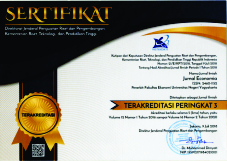The Economics of Rotating Savings and Credit Associations (ROSCAs) and Poverty in Indonesia
Downloads
Abstract: Arisan or Rotating Savings and Credit Associations (ROSCAs) constitute one of the most commonly found informal financial institutions in the developing world. This study aims to analyze the effect of Rotating Savings And Credit Associations (ROSCAs) on poverty in Indonesia using panel data sourced from the fourth and fifth wave of the Family Life Survey (IFLS). This study used a conditional logit or fixed effect logit to see the effect of Rotating Savings and Credit Associations (ROSCAs) participation and control variables, which include individual, household, and community characteristics on poverty variables that are binary or categorized. The results showed that Rotating Savings and Credit Associations (ROSCAs) participation can reduce poverty. Meanwhile, this study shows that women who participate in Rotating Savings and Credit Associations (ROSCAs) can reduce poverty significantly.
Keywords: poverty, ROSCAs, IFLS, conditional logit
Ekonomi Arisan dan Kemiskinan di Indonesia
Abstrak: Arisan atau Rotating Savings and Credit Associations (ROSCAs) merupakan salah satu lembaga keuangan informal paling umum yang terdapat di negara berkembang. Penelitian ini bertujuan untuk melihat pengaruh arisan (ROSCAs) terhadap kemiskinan di Indonesia dengan menggunakan data panel yang bersumber dari Indonesia Family Life Survey (IFLS) gelombang keempat dan kelima. Metodologi yang digunakan dalam penelitian ini adalah Conditional Logit atau Fixed Effect Logit untuk melihat pengaruh variabel partisipasi arisan dan variabel kontrol yang meliputi karakteristik individu, rumah tangga, dan komunitas terhadap variabel kemiskinan yang bersifat biner atau kategori. Hasil penelitian ini menunjukkan bahwa partisipasi arisan dapat mengurangi kemiskinan. Selain itu, penelitian ini menunjukkan bahwa perempuan yang berpartisipasi dalam arisan dapat mengurangi kemiskinan secara signifikan.
Kata kunci: Kemiskinan, arisan, IFLS, conditional logit
Downloads
Acquah, J. K., & Dahal, R. (2018). ROSCAs as lenders of last resort after financial crises: lessons from indonesia. Journal of International Development, 30(7), 1223–1239. https://doi.org/10.1002/jid.3366
Ahmad, Q. K. (2003). Towards poverty alleviation: the water sector perspectives. International Journal of Water Resources Development, 19(2), 263–277. https://doi.org/10.1080/0790062032000089356
Anderson, S., & Baland, J.-M. (2002). The economics of roscas and intrahousehold resource allocation. The Quarterly Journal of Economics, 117(3), 963–995. https://doi.org/10.1162/003355302760193931
Anggraeni, L. (2009). Factors influencing participation and credit constraints of a financial self-help group in a remote rural area: the case of ROSCA and ASCRA in Kemang village West Java. Journal of Applied Sciences, 9(11), 2067–2077.
Badan Pusat Statistik. (2008). Kemiskinan dan Ketimpangan. Publikasi BPS. Jakarta.
Badan Pusat Statistik. (2016). Kemiskinan dan Ketimpangan. Publikasi BPS. Jakarta.
Bergstrom, J.C et al. (2003). Use of chamberlain fixed effects approach to estimate willingness-to pay for little Tennessee river basin management alternatives. Selected Paper, Southern Agricultural Economics Association Meeting
Besley, T., Coate, S., & Loury, G. (1994). Rotating savings and credit associations, credit markets and efficiency. The Review of Economic Studies, 61(4), 701–719. https://doi.org/10.2307/2297915
Dagnelie, O., & Lemay"Boucher, P. (2012). Rosca participation in Benin: A commitment issue. Oxford Bulletin of Economics and Statistics, 74(2), 235–252. https://doi.org/10.1111/j.1468-0084.2011.00641.x
Imai, K. S., Arun, T., & Annim, S. K. (2010). Microfinance and household poverty reduction: New evidence from India. World Development, 38(12), 1760–1774. https://doi.org/10.1016/j.worlddev.2010.04.006
Johnston, J. S. (2017). The Freedom to Fail: Market Access as the Path to Overcoming Poverty and Inequality. Harv. JL & Pub. Pol'y, 40, 41.
Kapungwe, A. (2004). poverty in zambia: levels, patterns and trends. Development Southern Africa, 21(3), 483–507. https://doi.org/10.1080/0376835042000265450
Kementerian Pendidikan dan Kebudayaan Republik Indonesia. (2016). KBBI Daring: Arisan. Badan Pengembangan Bahasa dan Perbukuan. Jakarta.
Kimuyu, P. K. (1999). Rotating saving and credit associations in rural East Africa. World Development, 27(7), 1299–1308. https://doi.org/10.1016/S0305-750X(99)00049-2
UNDP. (2006). Goal 1: No poverty. Publikasi UNDP. New York.
UNDP. (2017). Financing the Sustainable Development Goals in ASEAN: Strengthening integrated national Financing frameworks to deliver 2030 Agenda. Publikasi UNDP. Thailand.
Varadharajan, S. (2004). Explaining Participation in Rotating Savings and Credit Associations (RoSCAs): Evidence from Indonesia, 1–58.
Wooldridge, J. M. (2015). Introductory econometrics: A modern approach. Nelson Education.
World Bank. (2003). World Development Report. Publikasi World Bank. Washington, DC.
Worldbank. (2006a). Era Baru dalam Pengentasan Kemiskinan di Indonesia. The World Bank (p. XL).
World Bank. (2006b). Making the New Indonesia Work for the Poor. Publikasi World Bank. Washington, DC.
World Bank. (2018). Poverty and Shared Prosperity: Piecing Together the Poverty Puzzle. The World Bank Group (pp. 1–201). https://doi.org/10.1596/978-1-4648-1330-6
Yusuf, N., Ijaiya, G. T., & Ijaiya, M. A. (2009). Informal financial institutions and poverty reduction in the informal sector of Offa town, Kwara state: A case study of rotating savings and credit associations (ROSCAs). Journal of Social Sciences, 20(1), 71–81. https://doi.org/10.1080/09718923.2009.11892724















